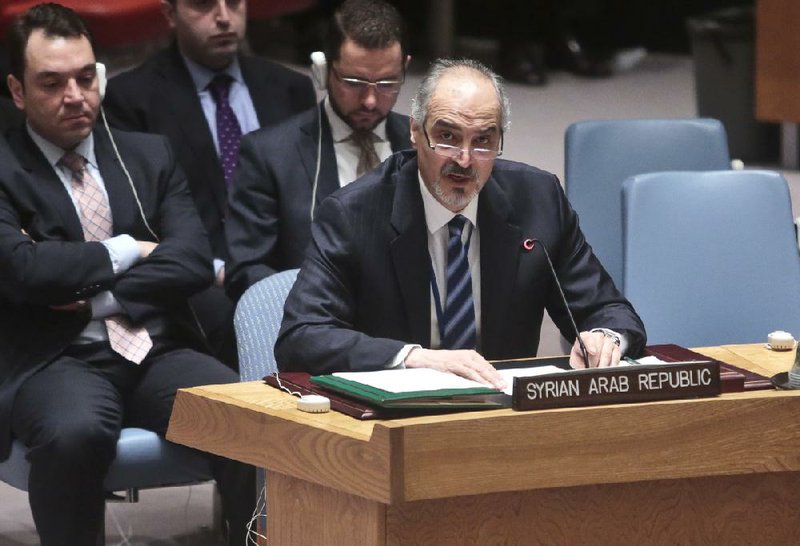UNITED NATIONS - The U.N. Security Council united for the first time on a resolution on Syria’s humanitarian crisis Saturday, demanding that President Bashar Assad’s government and the opposition provide immediate access everywhere in the country to deliver aid to millions of people in desperate need.
The fate of the Western and Arab-backed resolution rested with Russia, Syria’s closest ally, and China, another supporter.
After two weeks of negotiations and a watering down of the original text, they decided to join the rest of the 15-member council in sending a strong message, especially to the Assad government, that food, medicine and other essentials must not be blocked to civilians caught in the three-year conflict.
“Today the council has finally shown that whatever its political differences over Syria, it was not entirely indifferent to the devastating humanitarian crisis,” Britain’s United Nations Ambassador Mark Lyall Grant said after the vote.
According to the U.N., 9.3 million Syrians are in need of humanitarian assistance and 6.8 million have fled their homes but remain in the country.
The resolution does not threaten sanctions: Russia insisted that this reference be dropped from the original text.
Instead, it asks Secretary-General Ban Ki-moon to report to the council every 30 days on implementation and expresses the council’s intention to take “further steps” if the resolution’s demands aren’t fulfilled.
All Security Council resolutions are legally binding, but what remains to be seen is whether this resolution has an effect on the ground, especially because it doesn’t have real “teeth.”
U.N. humanitarian chief Valerie Amos expressed hope in a statement that it “will facilitate the delivery of aid to people in desperate need in Syria.”
Calling the resolution a “long overdue” measure “to alleviate the worst humanitarian crisis of this generation,” U.S. Ambassador Samantha Power said that as hard as it was to win council approval, the harder issue is implementation.
“The world now needs to stand united on behalf of implementation so that there are no more broken promises, no more delays, no more coupling minor concessions with cruel and shameless attacks on civilians,” Power said.
France’s U.N. Ambassador Gerard Araud said implementation “depends on the goodwill of the Syrian regime and the opposition.”
If the resolution’s demands aren’t fulfilled, he said, France will propose “further measures.”
The resolution demands that all parties, especially the Syrian government, “promptly allow rapid, safe and unhindered access … across conflict lines and across borders” for humanitarian aid, and it calls on both sides “to immediately lift the sieges of populated areas.”
It demands that all parties “cease depriving civilians of food and medicine indispensable to their survival.” It also demands a halt to all attacks against civilians, including indiscriminate shelling and aerial attacks using barrel bombs in populated areas.
Ban told the council immediately after the vote that the resolution “should not have been necessary” because “humanitarian assistance is not something to be negotiated - it is something to be allowed by virtue of international law.”
Russia and China had vetoed three previous resolutions backed by Western nations that would have pressured Assad to end the conflict, which according to activists has killed more than 136,000 people.
Russia’s U.N. Ambassador Vitaly Churkin said Moscow supported the humanitarian resolution because “many Russian considerations were borne in mind, and as a result the document took on a balanced nature.”
He accused the resolution’s sponsors - Australia, Luxembourg and Jordan - and its supporters of raising the humanitarian crisis in the council “only after it became clear that attempts to use a deterioration of this humanitarian situation in order to carry out a regime change was unsuccessful.”
Churkin also insisted that efforts to get humanitarian access in Syria, “although not as quickly as we would have liked, is getting positive, concrete results.”
China’s U.N. Ambassador Liu Jieyi strongly urged all parties to implement the resolution “in good faith.”
“China is gravely concerned at the worsening humanitarian situation in Syria,” he said.
“We deeply sympathize with people, and we hope to see an early and prompt amelioration of the situation in Syria.”
Syria’s U.N. Ambassador Bashar Ja’afari told the council that since the beginning of the crisis “the Syrian government was keen to improve the humanitarian situation of the people” and “it has continued to work day and night in order to perform all the humanitarian needs of its citizens.”
Ja’afari added that the Syrian government is providing 75 percent of the humanitarian assistance in the country while the U.N. and other organizations have supplied only 25 percent.
Meanwhile, Syrian government forces Saturday captured two rebel-held areas on the edge of the Israeli-occupied Golan Heights after days of intense fighting near a decades-old cease-fire line between Syria and Israel, state TV said.
The Syrian TV report, citing a military official, said troops and pro-government gunmen known as National Defense Forces captured the areas of Rasm al-Hour and Rasm al-Sad, south of the town of Quneitra.
The Britain-based Syrian Observatory for Human Rights confirmed troops were on the offensive, adding that the air force was taking part in the attack.
The Syrian army has been reinforcing its positions in Quneitra as part of efforts to drive rebels from the area, which is near the Israeli-occupied Golan Heights, since the opposition named a new military chief last week.
Brig. Gen. Abdul-Ilah al-Bashir hails from southern Syria and was an army commander in Quneitra until 2012, when he defected to the opposition.
Also Saturday, Syrian activists said Kurdish fighters captured a northeastern town near the Iraqi border after days of combat with members of an al-Qaida breakaway group.
The Observatory and a Syria-based activist who identified himself as Salar al-Kurdi said members of the so-called People’s Protection Units captured Tel Brak earlier in the day.
The battle left some 19 people dead, of which 16 were Islamic State fighters, the Observatory said.
Information for this article was contributed by Bassem Mroue of The Associated Press.
Front Section, Pages 7 on 02/23/2014

